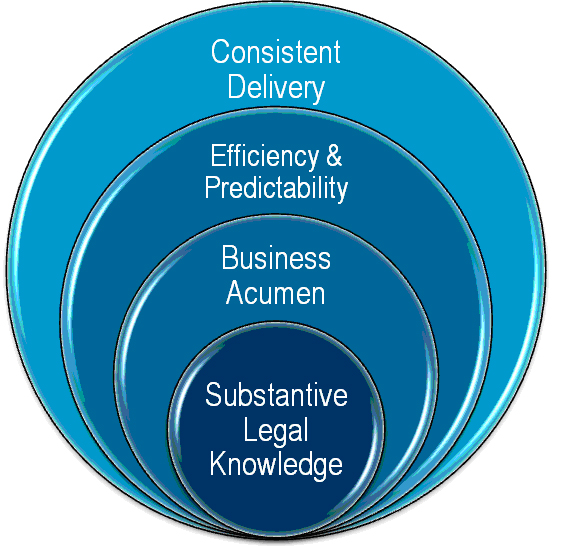When I started practicing law in 1982, a good lawyer was one who possessed superior substantive knowledge of an area of the law. Those lawyers read cases and law review articles. Their ability to advise clients on what the law was made them masters of their craft.
Things have changed. A lot, as it turns out.
At a recent program offered by the Association of Corporate Counsel, Nancy Jessen of Huron Consulting shared this graphic, which she kindly allowed me to use here:

Nancy had perfectly captured the evolution of the top-flight lawyer, the trusted adviser. It was not a surprise to many (though it clearly was to some) that it was no longer enough to simply know the law. One had to know his or her client’s business and had to be a business adviser. This evolution required lawyers to use a skill set—business judgment, business acumen—that few had ever developed. For most of the last 15 years, superior legal skills and business judgment made for an elite lawyer.
But these days, still more is required. Skilled judgment must be delivered efficiently. Clients care what service costs—even skilled service. Clients want service to be delivered predictably. They do not want work to be at X for one matter and 3X for another, similar matter.
The “consistent delivery” ring may be different than the “efficiency and predictability” ring. But the difference wasn’t explained, nor can I discern any material difference.
On occasion, I have espoused the notion that elite lawyers are those who act as general contractors for their clients. These lawyers assemble the necessary labor talent and manage it, just like a contractor leads the various trades in the construction of a building. I think a better visual is actually the elite lawyer acting as a symphony conductor—finding and developing individual talent, helping those talented individuals learn to play in harmony, and together producing music that none could produce alone.
Whichever comparison is more apt, the essential elements are the same. The elite lawyer is causing other lawyers and third parties to work efficiently and effectively together to produce results at a cost known to and approved by the client.
The profession has never grappled with the need to teach business skills to lawyers to help more develop into the elite role of trusted adviser. It seems unlikely that the profession will any more effectively grapple with the issues relevant to lawyers acting as general contractors or symphony conductors.
In the absence of law school training and meaningful mentoring of these skills, it falls to the individual to find opportunities to learn and implement these skills. It also would be a wise general counsel who would invest in training, not only for herself and her team, but also for her team of outside counsel. The return on this investment would generate savings sustained over time. So what skills should a lawyer learn?
• Learn how to read a financial statement. Understand the economics of your client’s business.
• Learn management risk analysis. Your client does not operate in a risk free-world. All decisions involve risk and are based on less than certain information. Learn how those decisions are made.
• Learn project management and process-mapping skills. Your client has learned these skills, directly or indirectly, and if nothing else, using these tools improves communication.
There are more skills one could learn, but these certainly would be a strong foundation from which to work.
Patrick Lamb is a founding member of Valorem Law Group, a litigation firm representing business interests. Valorem helps clients solve their business disputes and coping with pressures to reduce legal spend using nontraditional approaches, including use of nonhourly fee structures, coordination with LPOs or contract lawyers, joint-venturing with other firms and implementation of project management tools to handle lawsuits or portfolios of litigation.
Pat is the author of the the recently published book Alternative Fee Arrangements: Value Fees and the Changing Legal Market. He also blogs at In Search Of Perfect Client Service.